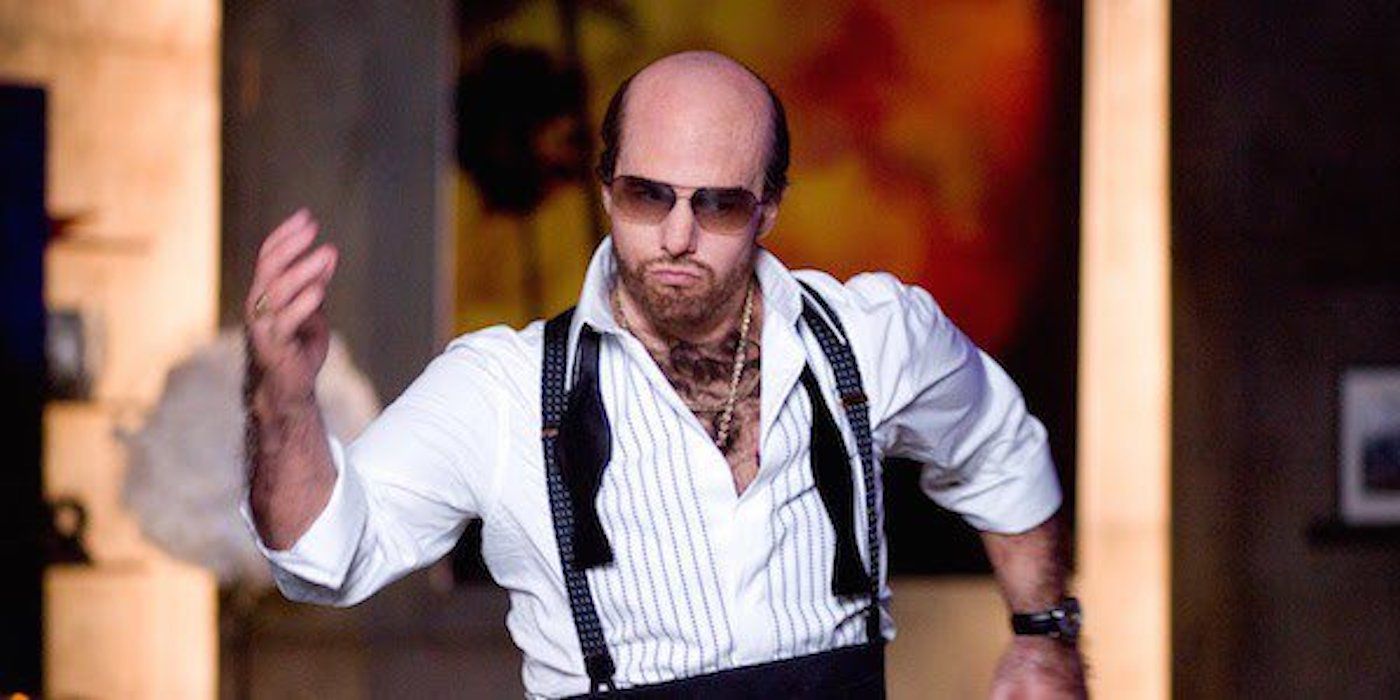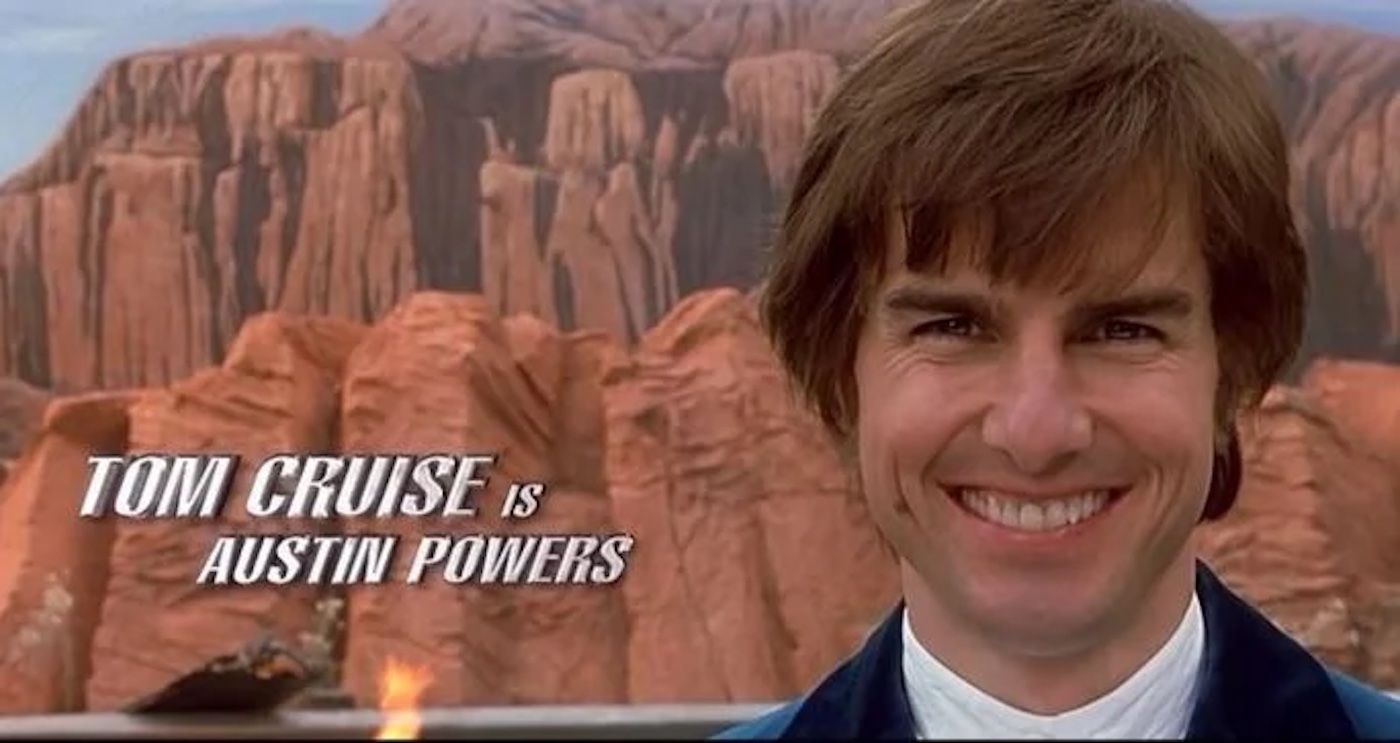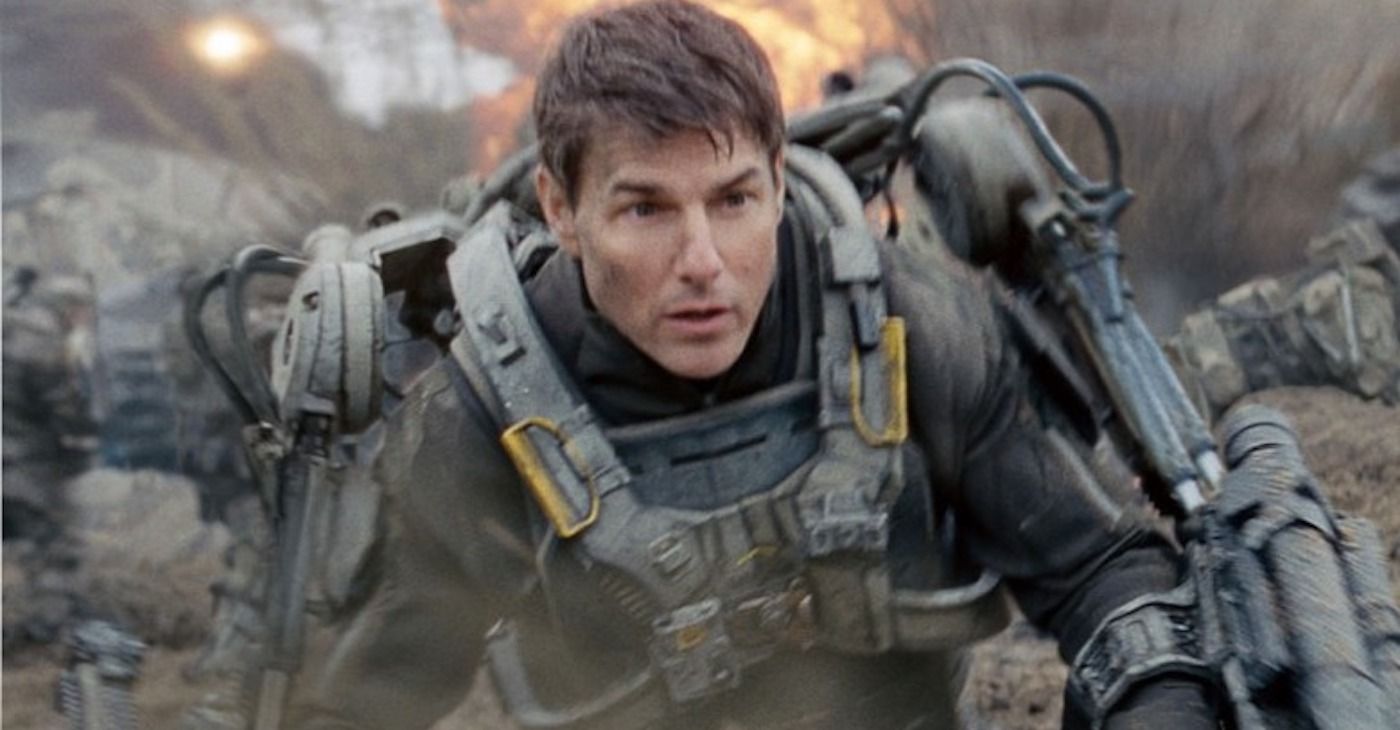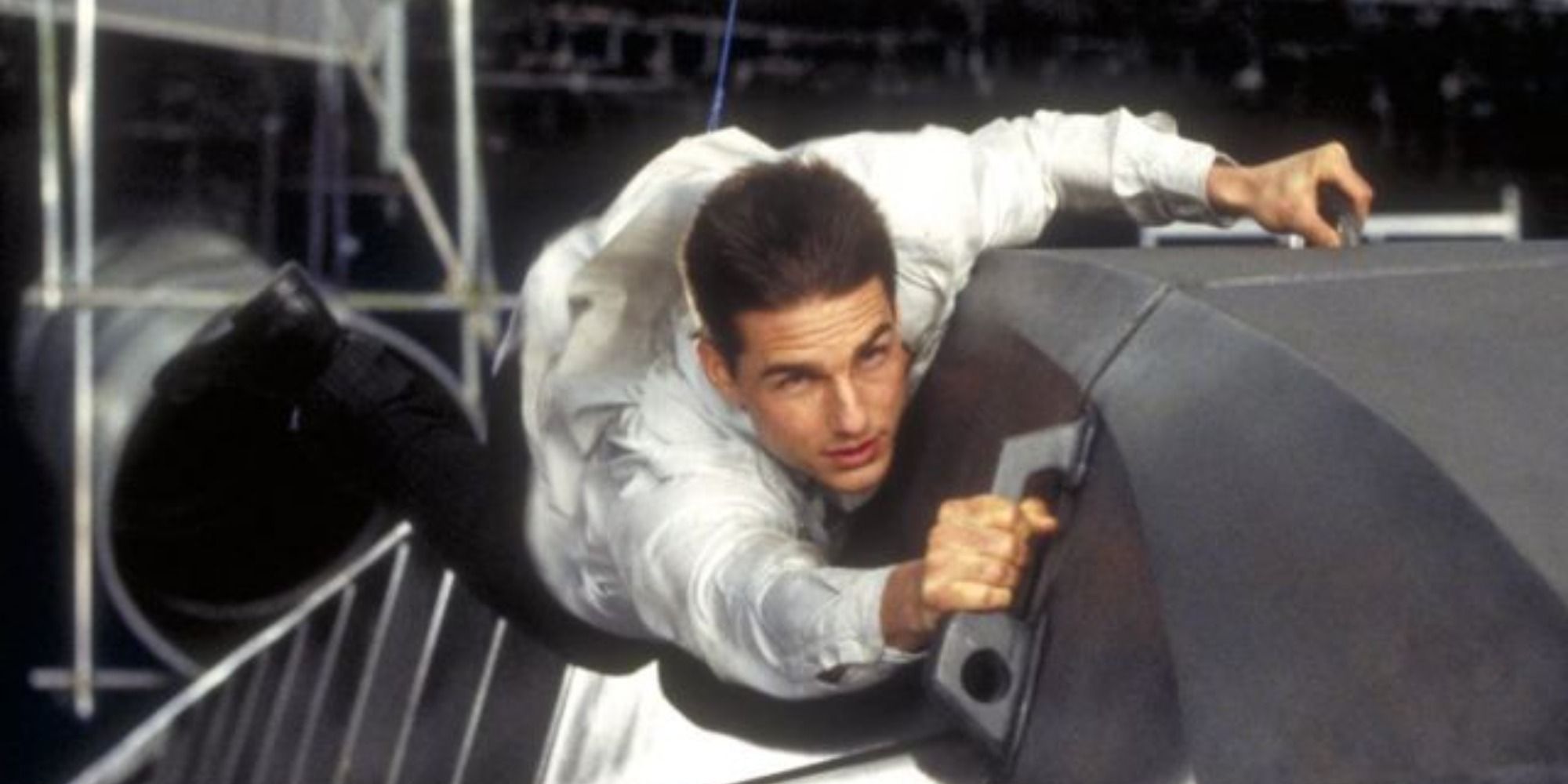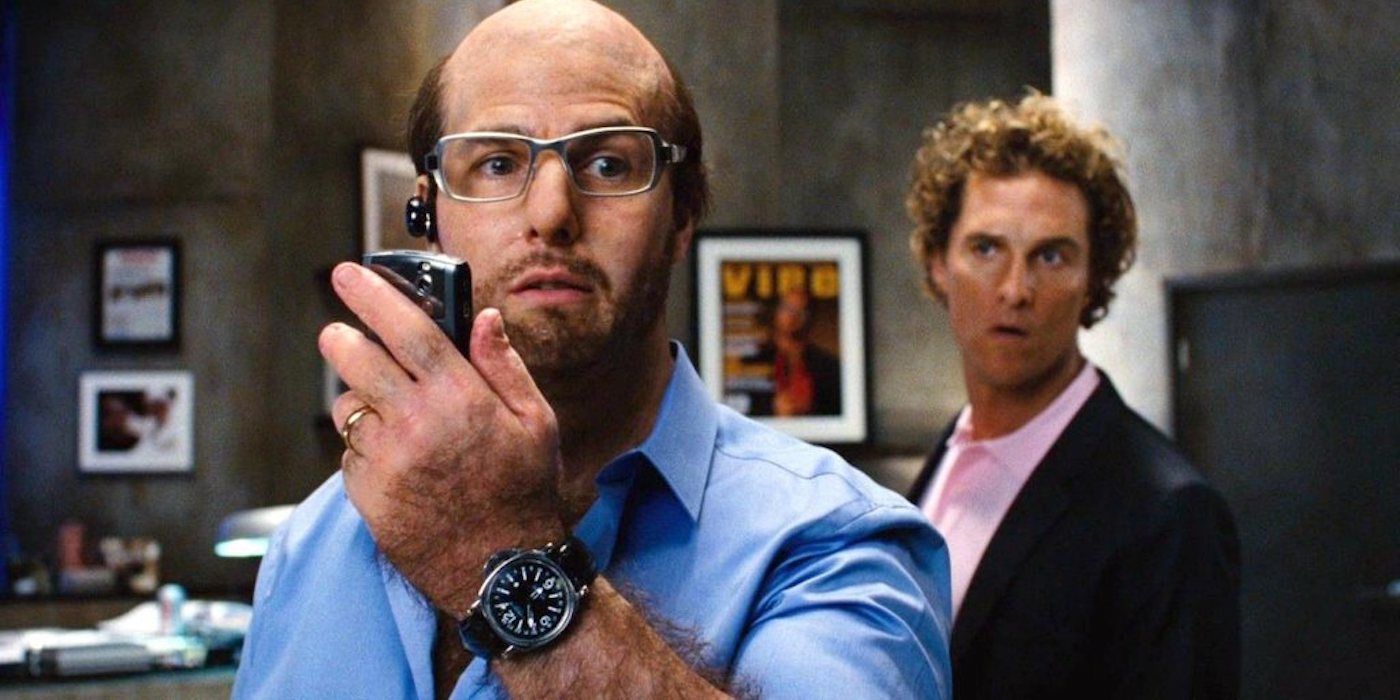In his modern form, Tom Cruise is famous for his running, his indulgence in uber-dangerous stunts, and for jumping around on a couch. Your mileage may vary on what you personally think about each of those facets of his star image. However, there’s no denying that he’s endured in the public consciousness because of his commitment to a consistent star image audiences can lean on for spectacle and entertainment. But one aspect of that consistency that doesn’t get enough credit is Cruise’s penchant for comedy. Though you wouldn’t think of Oblivion or Mission: Impossible: Fallout as peak humor, various manifestations of comedic commentary on Cruise’s star image has proven to be an integral part of his 21st-century brand image.
Of course, it’s not like Cruise has been entirely unfamiliar with the world of comedies as an actor. The man got his big break with Risky Business, after all, while his biggest award season vehicles, Rain Man and Jerry Maguire, were as much comedies as they were dramas. The man even ushered in the opening of Austin Powers in Goldmember in 2003 by portraying the titular super-spy in an in-universe movie. But starting in the late 2000s, Cruise began to inject a greater emphasis on comedy in his career, particularly in his action fare, that didn’t just see Cruise being funny. This comedy was meant to play on the public’s perception of Cruise, it was a commentary on this actor as a pop culture icon.
Many of Cruise’s roles in the 21st-century are just as aware of the audience’s expectation that Cruise is someone who does death-defying stunts and walks away from explosions without a scratch. The only way to confront the ubiquity of that invulnerable image was to go a route where Cruise could at the very least nod towards this status quo with comedic performances that subverted expectations for what this man’s leading roles looked like. Nowhere has this been more apparent than in the 2014 film Edge of Tomorrow, which saw Cruise playing William Cage, a public affairs officer who has no ambitions of fighting in the war against extra-terrestrials consuming Earth.
Once he finds himself not only on this battlefield but reliving the same day of this war on repeat, the screenplay and Cruise’s performance begin to lean into the comedic possibilities of having endless retries at a massively important mission. Whereas the first three Mission: Impossible movies were built on scenarios where time was of the essence, here, Cruise’s Cage had all the time in the world, literally. This led to comedic set pieces that would end not with Cruise being triumphant but getting run over by a car, much to the befuddlement of everyone around him. These were amusing pieces of dark comedy inherently, but they’re especially amusing when serving as a contrast to the perfectly perfect action movie image of Cruise.
Watching Cruise get bopped around all the time and experience severe life-ending injuries, even when he’s just training with Sergeant Rita Vrataski (Emily Blunt), is a gag that shockingly never gets old in Edge of Tomorrow. Cage does eventually get good enough at the whole Groundhog Day scenario to become more proficient in his action sequences, but that’s not the norm for Edge of Tomorrow. Instead, the film predominately concerns itself with a gloriously amusing comedic subversion of what we expect a Tom Cruise action star to be. Rather than running from or ignoring Cruise’s blockbuster movie image, Edge of Tomorrow finds all the comedic possibilities in dismantling it.
A year after Edge of Tomorrow, the emphasis on Cruise getting into comedic mishaps while engaging in action movie stunts even infiltrated the man’s trademark franchise, Mission: Impossible. Now, this series has always wrung lots of tension out of the smallest hiccups making all the difference in monumental schemes. Just ask the rat in the air vent in the first Mission: Impossible or those malfunctioning gloves in Mission: Impossible – Ghost Protocol. But Mission: Impossible – Rogue Nation took things to the next level by often making Cruise’s Ethan Hunt someone who requires the help of Ilsa Faust (Rebecca Ferguson) to pull off his missions.
Hunt is certainly less prone to comedic deaths than Cage, but Rogue Nation signaled a slight tweak for the character, one that would exacerbate a subtle detail of earlier films by really leaning into comedy when this super-spy found himself in over his head. This really became apparent in Mission: Impossible – Fallout, where Cruise’s comparatively smaller frame next to Henry Cavill’s August Walker/John Lark innately makes Hunt seem humorously out of his depth. Ensuing scenes in the film depicting Hunt being terrified to jump out a window or struggling to climb up a rope emphasizes that this isn’t quite the same man who didn’t even blink when talking about breaking into the Pentagon in the first Mission: Impossible. Hunt, like most modern Tom Cruise characters, has now become more human than ever.
Comedy also manifests across Cruise’s work in these two Mission: Impossible movies in the style of physical acts he engages in. They’re as impressive, if not considerably more so, in scope and filmmaking than anything in earlier entries in the series. However, there’s an undeniable comedic undercurrent to their constant sense of escalation. Plus, there’s a hysterical quality to how so incredibly out of his depth Hunt is, clinging to the side of a plane or getting hit by a car while riding a motorcycle. The comedic undertones of such set pieces aren’t incidental. In talking about the action sequences in Rogue Nation and Fallout, director Christopher McQuarrie doesn’t reference other explosion-heavy features as inspiration for these sequences, but silent movie comedians like Charlie Chaplin, Harold Lloyd, and Buster Keaton.
Channeling such icons of comedy cinema makes perfect sense for the series and its emphasis on astonishing feats of physicality. Even better, taking cues from this trio fits in nicely with how much Cruise’s modern movies lean on comedy. Cruise can still save the day and risk his life in staggering stunts, but his recent portrayals of Ethan Hunt have been more in line with stories anchored by Chaplin and Keaton about everymen swept up in inexplicable and bizarre scenarios. Through leaning into these comedic influences, the set pieces of Mission: Impossible can maintain some tension (since it’s not just assumed from the get-go that Hunt can survive anything unscathed) and Cruise can ensure that he’s not just regurgitating the same star image that he had in the 1990s.
This comedy can even manifest in dark ways across his 21st-century works. Take the 2004 masterpiece Collateral, which sees Cruise playing the antagonistic contract killer Vincent. This character might’ve been played as a straightforward badass in another film, but here, he’s played as a nightmare for cab driver Max (Jamie Foxx). This movie is a neo-noir thriller first and foremost, not a comedy. However, director Michael Mann does find time to wring moments of dark levity out of Vincent’s nonchalant attitude towards killing and his contempt for other people. The cool as a cucumber attitude Cruise plays in his other action movies is here grounded in reality and contrasted with other normal people to suggest how terrifying people like Ethan Hunt would be in real life. It’s another subversion and commentary on Cruise’s star image, one lighter in humor, but punctuated by moments of levity nonetheless.
But perhaps the most important way comedy has become so influential for Cruise in his 21st-century film work is in his iconic cameo in Tropic Thunder as studio executive Les Grossman. Given lots of prosthetics, a foul-mouthed temper, and a penchant for dancing to the music of Ludacris, it’s about as far as you can get from Maverick in Top Gun. That’s the point. The way Grossman functions as a total opposite of the conventional Cruise role makes it all the more amusing to see the leading man of Vanilla Sky inhabiting the role. Leaning into comedy in his 21st-century movies has kept moviegoers on their toes when it comes to Cruise’s leading man work, but that creative direction has never taken audiences to more unexpected and hysterical places than his work (and dance moves!) as Les Grossman.
Read Next
























































![Key Metrics for Social Media Marketing [Infographic] Key Metrics for Social Media Marketing [Infographic]](https://www.socialmediatoday.com/imgproxy/nP1lliSbrTbUmhFV6RdAz9qJZFvsstq3IG6orLUMMls/g:ce/rs:fit:770:435/bG9jYWw6Ly8vZGl2ZWltYWdlL3NvY2lhbF9tZWRpYV9yb2lfaW5vZ3JhcGhpYzIucG5n.webp)


